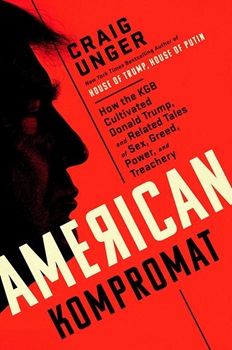Description
**THE INSTANT NEW YORK TIMES BESTSELLER** Kompromat n.—Russian for "compromising information" This is a story about the dirty secrets of the most powerful people in the world—including Donald Trump. Based on exclusive interviews with intelligence officers in the CIA, FBI, and the KGB, thousands of pages of FBI investigations, police investigations, and news articles in English, Russian, and Ukrainian. American Kompromat shows that from Trump to Jeffrey Epstein, kompromat was used in operations far more sinister than the public could ever imagine. The book addresses what may be the single most important unanswered question of the entire Trump era: Is Donald Trump a Russian asset? The answer, American Kompromat says, is yes, supporting that conclusion with the first richly detailed narrative on how the KGB allegedly first “spotted” Trump as a potential asset, how it cultivated him, arranged his first trip to Moscow, and pumped him full of KGB talking points. Among its many revelations, American Kompromat reports for the first time that: • According to former KGB major Yuri Shvets, Trump first did business over forty years ago with a Manhattan electronics store co-owned by a Soviet émigré, triggering protocols through which the Soviet spy agency began efforts to cultivate Trump as an asset, launching a decades-long “relationship” of mutual benefit to Russia and Trump, from real estate to real power. • Trump’s 1987 invitation to Moscow was billed as a scouting trip for a hotel, but according to Shvets, was actually initiated by a high-level KGB official. These sorts of trips were usually arranged for "deep development." • Before Trump’s first Moscow trip, he met with Natalia Dubinin, who worked at the United Nations library in a vital position usually reserved as a cover for KGB operatives. • In 1987, according to Shvets, the KGB circulated an internal cable hailing the successful execution of an active measure by a newly cultivated American asset who took out full-page ads in The New York Times, The Washington Post, and The Boston Globe promoting policies promoted by the KGB. The ads had been taken out by Donald Trump, who, Shvets said, would become a “special unofficial contact” for the KGB. In addition to exploring Trump’s ties to the KGB, American Kompromat also reveals: • How Jeffrey Epstein and Trump jostled for influence and financial supremacy for years. Epstein became a millionaire in part with the help of Ghislaine Maxwell’s father—media tycoon Robert Maxwell, who allegedly served as a spy and likely gave Epstein a sum between $10 and $20 million before his death in 1991. • How the Epstein-Ghislaine Maxwell sex-trafficking operation provided a source and marketplace for sexual kompromat. • How the Epstein-Maxwell ring helped enable young women with possible ties to Russian intelligence to gain access to the highest levels of Silicon Valley and the worlds of artificial intelligence, supercomputers, and the internet. This, at a time when Vladimir Putin has asserted, “Whoever becomes the leader in this sphere [artificial intelligence] will become the ruler of the world.” • How John Mark Dougan, a former deputy sheriff in Mar-a-Lago’s Palm Beach County, says he acquired 478 videos confiscated from the Jeffrey Epstein investigation, fled to Moscow, became only the fourth American to win asylum in Russia, and immediately gained access to Putin’s inner circle, showing the ongoing power that comes from kompromat and how its value is highest before it is “used.”
About the Author
Craig Unger is an American journalist and writer. His most recent book isThe Fall of the House of Bush, about the internal feud in the Bush family and the rise and collusion of the neoconservative and Christian right in Republican party politics, viewing each group's weltanschauung and efforts concerning present and potential future US policy through a distinctly negative prism. His previous work,House of Bush, House of Saudexplored the relationship between the Bush family and the House of Saud. Craig Unger's work is featured in Michael Moore's filmFahrenheit 9/11. Unger has served as deputy editor of the New York Observer and was editor-in-chief of Boston Magazine. He has written about George H. W. Bush and George W. Bush for The New Yorker, Esquire Magazine and Vanity Fair.
